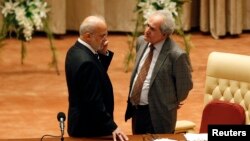Iraq's new parliament will hold its next session July 13, the acting speaker said on Tuesday, after a five-week delay announced on Monday was criticized by local lawmakers and the United States.
The first session of the parliament elected in April ended last week without agreement on the three key posts of prime minister, president and parliamentary speaker, with the country in crisis over the seizure of large parts of the north and west by Sunni Islamist insurgents.
"For the sake of the public interest and committing to the constitutional procedures and preserving the continuity of building democracy ... we decided to change the date (of the next session) to July 13," Mehdi al-Hafidh said in a statement.
"Any delay in this could jeopardize the security of Iraq and its democratic course and increase the suffering of the Iraqi people," the statement said.
"Dire situation"
On Monday, citing the failure of the main Shi'ite, Sunni and Kurdish political groupings to reach agreement, Hafidh had said the next session would not be held until Aug. 12.
The U.S. State Department reacted by saying that the "dire situation" facing Iraq made forming an inclusive government all the more urgent.
Despite the decision to meet early next week, it still appears unlikely political leaders will be able to bridge their differences in time to settle on names for the top leadership posts - particularly the prime minister, with incumbent Nouri al-Maliki resisting a campaign to replace him.
Maliki's opponents - and many former allies - want him removed, accusing him of monopolizing power during his eight years in office and contributing to the current crisis by failing to promote reconciliation with Sunnis.
But he has vowed he will not abandon his bid for a third consecutive term.
Maliki's State of Law bloc won the largest share of seats in April's election, securing 92 out of parliament's 328 seats. But he is far short of the majority needed to govern, which means he needs to cobble together a coalition government.
Also Tuesday, U.S. Attorney General Eric Holder said the Justice Department has opened fewer than 100 investigations into American citizens who may have traveled to Syria or Iraq to fight.
"I would say it is less than 100 at this point. It is not precise," Holder said after meeting the Norwegian justice minister to discuss the issue of radicalization.
"We are concerned about our citizens leaving our shores to go to Syria, to Iraq, to be involved in the fight there and to potentially come back to the United States and do something of a criminal nature in our country," Holder told reporters.
Baathists targeted
In the past week, Sunni militants who overran the city of Mosul last month have rounded up between 25 and 60 senior ex-military officers and members of former dictator Saddam Hussein's banned Baath party, residents and relatives said on Tuesday.
The crackdown could signal a rift in the Sunni alliance that helped secure the militant fighters' swift victory when they captured Mosul last month.
The northern city of about 2 million people is by far the largest to fall to the group now known as the Islamic State and a central part of its plans for an Islamist caliphate.
When the group, then known as the Islamic State in Iraq and the Levant (ISIL), seized large swaths of Iraq last month, it was supported by other Sunni Muslim armed groups.
Tribes and former loyalists of Saddam's Baath party were eager to strike at Iraq's Shi'ite leaders, even if they did not share ISIL's vision of a caliphate ruled on medieval Islamic precepts.
But now, leaders of those groups are being ordered to swear allegiance to the new caliphate.
“I think (the Islamic State) wants to give the message that they are the only group in the land, that people must follow them or give up their weapons,” said provincial governor Atheel Nujaifi, who is in touch with residents by phone after having fled to the Kurdish-controlled city of Irbil as Mosul fell.
Shi'ite parliamentarian Haidar Abadi said the Islamic State was taking pre-emptive action to head off potential challenges.
“ISIL knows very well they can't stay if these groups move against them. They are not giving them the opportunity," Abadi said.
“ISIL called on their friends who are ex-Baathists to cooperate and they did. And now ISIL is kicking them out. Some will pledge allegiance. Those they don't believe will pledge allegiance, they will execute,” he added.
An Iraqi national intelligence officer, confirming the arrest by militants of Saddam-era officers, said the motive was: “to panic people, or as revenge, or in the event that they would cooperate with the Iraqi government."
Some information for this report provided by Reuters and AP.

